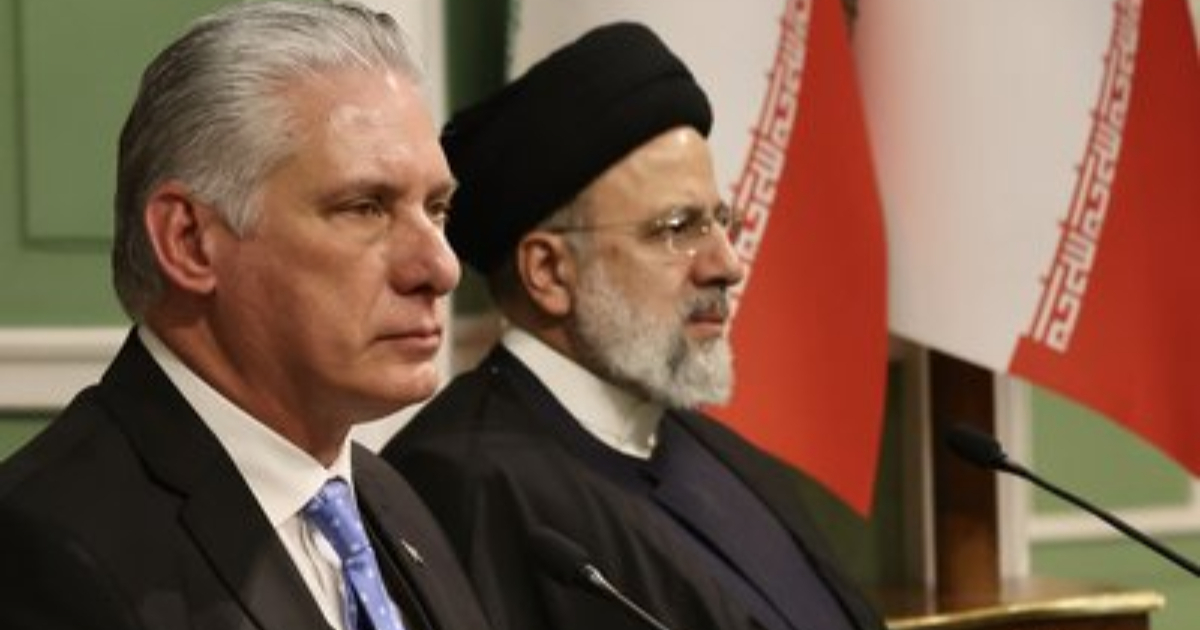Cuban leader Miguel Díaz-Canel expressed his condolences on the death of the President of Iran, whom he described as an "admirable politician beloved by his people." Following the confirmation of Ebrahim Raisi's death on Sunday in a helicopter crash, Díaz-Canel tweeted that the Party and the people of Cuba "deeply mourn the loss of a great friend."
This statement has incited outrage among Cuban netizens, who demanded that Díaz-Canel refrain from speaking on their behalf. "The people of Cuba? Did you ask? Honestly, I don't think anyone laments this accident. On the contrary, they see it as divine justice. You, my friend, will know it too," one man predicted.
Democracy activist Mag Jorge Castro reminded everyone, "An 'admirable politician' who killed over five thousand prisoners in the '80s and led a country where women have no rights... these are the role models of communist Cuba."
A doctor added, "Even his own mother didn't like that terrorist murderer. Take a helicopter ride yourself; I'll pay for the trip."
A blogger noted, "Keep us Cubans out of your mess. First of all, that barbarian was so beloved by his people that they were celebrating with fireworks last night. You have the nerve to celebrate misogynistic, homophobic, and terrorist men, but well, he was your little friend."
Lis Cuesta also shared Díaz-Canel's tweet, sending condolences to the wife and daughter of the Iranian president and the people of Iran. "I also need condolences because I've been sleeping for weeks without power, with mosquitoes, and with a child suffering through these life atrocities," a young father replied.
A Twitter user criticized, "You are a cyber troll who attends pro-homosexual rallies and sends condolences to a murderer of women and homosexuals. You have less intelligence than an amoeba."
Several users pointed out that women's rights are violated daily in Iran. "Why don't you stand with the women he had killed for not wearing a veil?" one man asked.
Another user emphasized, "Condolences to all the women in Iran whose rights are violated daily."
"But he was an ultra-right-wing murderer who ordered women to be hanged for being raped! Is this how bad the Cuban revolution has gotten? Is this what it's come to?" an internet user remarked.
A young woman asserted, "The Iranian people are celebrating with fireworks! The same will happen in Cuba when you fall; it will be a national holiday."
The President of the Islamic Republic of Iran, Ebrahim Raisi, died alongside several high-ranking officials, including the Foreign Minister, the Governor of the East Azerbaijan Province, and the region's chief imam.
The Ayatollah regime is a close ally of the Castro government. Raisi welcomed Díaz-Canel in Tehran last December during his tour of Middle Eastern countries. The Cuban leader spoke about his intention to strengthen ties with the Islamic nation, hoping it would become an important economic player to help Cuba overcome its crisis.
Accompanying Díaz-Canel during the official visit was his wife, who was "delighted" to tour Iran, visiting museums in the Saadabad Historical Cultural Complex and enthusiastically taking photos with her phone.
The Iranian president traveled to Havana in June for a meeting with Díaz-Canel and Raúl Castro. In the official welcoming ceremony, the Cuban leader emphasized the "unity among those of us condemned for wanting to build societies different from the ones the Yankee paradigm wants to impose, and for that, we have been subjected to blockades, unjust, inhumane, and unjustified sanctions."
Díaz-Canel's Condolences on Raisi's Death: Public Reaction
Here are some frequently asked questions regarding the public reaction to Díaz-Canel's statement on the death of Iranian President Ebrahim Raisi.
Who was Ebrahim Raisi?
Ebrahim Raisi was the President of Iran, known for his hardline stance and controversial human rights record.
Why did Díaz-Canel express condolences for Raisi's death?
Díaz-Canel expressed condolences due to the close political and economic ties between Cuba and Iran, referring to Raisi as a "great friend" of Cuba.
How did Cuban citizens react to Díaz-Canel's statement?
Many Cuban citizens reacted with outrage, criticizing Díaz-Canel for speaking on their behalf and pointing out Raisi's human rights abuses.
What are the human rights issues associated with Raisi?
Raisi was involved in the mass execution of political prisoners in the 1980s and led a regime that systematically violated women's rights and suppressed dissent.
